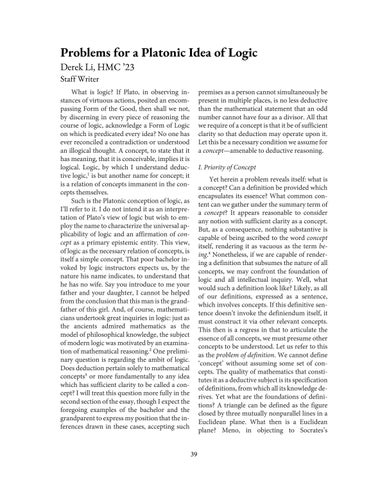Problems for a Platonic Idea of Logic Derek Li, HMC ’23 Staff Writer What is logic? If Plato, in observing instances of virtuous actions, posited an encompassing Form of the Good, then shall we not, by discerning in every piece of reasoning the course of logic, acknowledge a Form of Logic on which is predicated every idea? No one has ever reconciled a contradiction or understood an illogical thought. A concept, to state that it has meaning, that it is conceivable, implies it is logical. Logic, by which I understand deductive logic,1 is but another name for concept; it is a relation of concepts immanent in the concepts themselves. Such is the Platonic conception of logic, as I’ll refer to it. I do not intend it as an interpretation of Plato’s view of logic but wish to employ the name to characterize the universal applicability of logic and an affirmation of concept as a primary epistemic entity. This view, of logic as the necessary relation of concepts, is itself a simple concept. That poor bachelor invoked by logic instructors expects us, by the nature his name indicates, to understand that he has no wife. Say you introduce to me your father and your daughter, I cannot be helped from the conclusion that this man is the grandfather of this girl. And, of course, mathematicians undertook great inquiries in logic: just as the ancients admired mathematics as the model of philosophical knowledge, the subject of modern logic was motivated by an examination of mathematical reasoning.2 One preliminary question is regarding the ambit of logic. Does deduction pertain solely to mathematical concepts3 or more fundamentally to any idea which has sufficient clarity to be called a concept? I will treat this question more fully in the second section of the essay, though I expect the foregoing examples of the bachelor and the grandparent to express my position that the inferences drawn in these cases, accepting such
premises as a person cannot simultaneously be present in multiple places, is no less deductive than the mathematical statement that an odd number cannot have four as a divisor. All that we require of a concept is that it be of sufficient clarity so that deduction may operate upon it. Let this be a necessary condition we assume for a concept—amenable to deductive reasoning. I. Priority of Concept Yet herein a problem reveals itself: what is a concept? Can a definition be provided which encapsulates its essence? What common content can we gather under the summary term of a concept? It appears reasonable to consider any notion with sufficient clarity as a concept. But, as a consequence, nothing substantive is capable of being ascribed to the word concept itself, rendering it as vacuous as the term being.4 Nonetheless, if we are capable of rendering a definition that subsumes the nature of all concepts, we may confront the foundation of logic and all intellectual inquiry. Well, what would such a definition look like? Likely, as all of our definitions, expressed as a sentence, which involves concepts. If this definitive sentence doesn’t invoke the definiendum itself, it must construct it via other relevant concepts. This then is a regress in that to articulate the essence of all concepts, we must presume other concepts to be understood. Let us refer to this as the problem of definition. We cannot define ‘concept’ without assuming some set of concepts. The quality of mathematics that constitutes it as a deductive subject is its specification of definitions, from which all its knowledge derives. Yet what are the foundations of definitions? A triangle can be defined as the figure closed by three mutually nonparallel lines in a Euclidean plane. What then is a Euclidean plane? Meno, in objecting to Socrates’s 39



